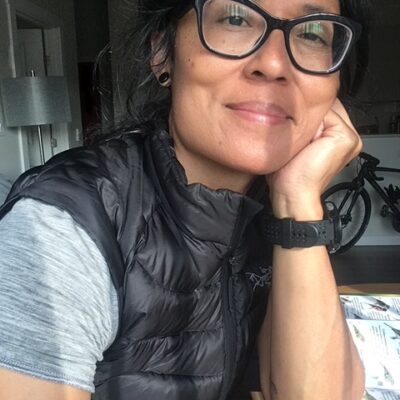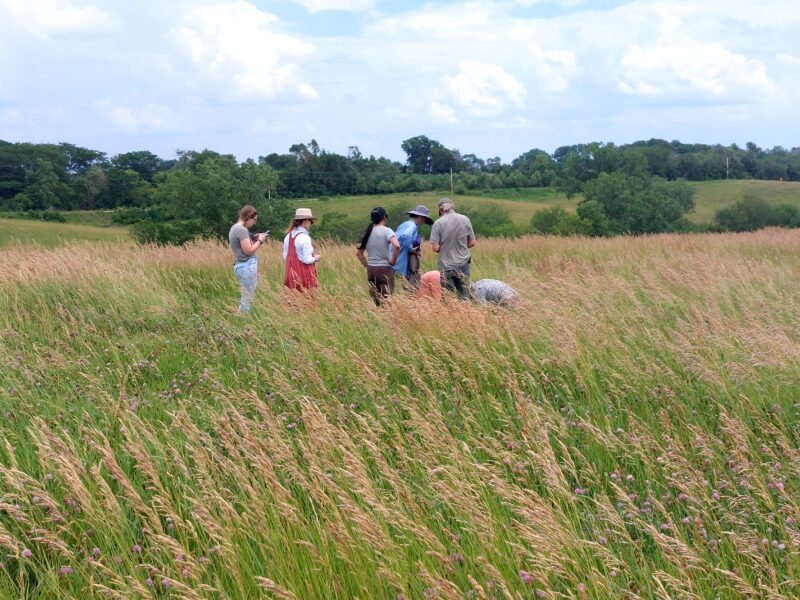Climate Land Leaders Board member Dr. Michelle Montgomery is a Haliwa Saponi (enrolled)/Eastern Band Cherokee (descendant) and tenured professor at the University of Washington, Tacoma. She recently attended a Climate Land Leaders meetup to lead an exploration into the landowners’ heartwork for 2050. Here she expands on her comments at the meetup on justice and allyship.*
What does justice demand?
Justice may demand fresh water, to keep the family farm going, to have fireflies light up the dark, to keep rising tides from swallowing island peoples. Because human justice is also about environmental justice and climate justice.

The climate, housing, infrastructure, access to jobs, it’s all connected. Maybe I’m so passionate about connecting the dots to everything because I move in spaces where people do not have their basic needs met.
We have the problems that we have now because people have been working in silos. We have a society that doesn’t acknowledge that we’re all connected to each other. For example, if you’re working in regenerative agriculture do the undocumented people working in rural communities have a voice? Are we listening to them?
Justice also demands that we find the grace and humility to listen to all the emotions and every word a person says. To do that, we need healthy, safe spaces to talk about justice and to share justice initiatives.
There’s a difference between acknowledging justice from a good place and using the word justice from a place that is not healthy. You can be a person of color and come from a place of not being healed and express justice in a way that is projecting your trauma onto others. It’s unfortunate when a person is talking about justice but stereotyping and chastising people. Yes, some people are more privileged than others, but we all have healing to do.
For example: Residential boarding schools are a horrific topic, a horrific history that should have never happened. But I’ve listened to elders talk about residential boarding schools in a way that they’re not projecting, and they’re not triggering others. They are sharing their story in a welcoming way to help ensure that this tragedy doesn’t happen again.
When I came into the space with the Climate Land Leaders at the Central Iowa meetup, there was so much healing going on. Some of the female elders that were part of that group are “retired” and feel like they’re not really being seen. Women have always been a part of farming history, but they were not allowed to be landowners. They have witnessed and experienced men saying they would try to help you on your land because you’re just a woman who doesn’t know what you’re doing. They may not have been able to marry whom they wanted. They may be from a generation that didn’t have the fertility options we have now.
And now these female bodies are major landowners. That’s a big statement. That’s historical.

Justice demands careful process. We have to be able to take in words and think about them. I’m constantly learning how to just absorb what the other person is saying in conversation and not speak instantly, to process the information that I am visually seeing and hearing and feeling. To do that, you have to come from a place of just love. You cannot have justice without love and compassion.
Justice changes. It’s not static, it’s not linear. But it requires careful listening, careful processing and seeing people for who they are when they present themselves. And respecting that.
Justice demands allyship. If you see something that is not fair, ask: What capacity do I have to create some sort of change? There isn’t a “one size fits all” approach to allyship, like “I must do this, or I must do that, or you know I can’t speak unless I’ve done this.” Big changes happen in small steps. They also happen in small spaces.
Allyship takes time. Allyship is really honoring that everyone can create change. It’s just a matter of where you are in life, where you can create change. What tools and resources do you have that you can use?
The first step is to speak your commitment to be an ally and really believe it. Then follow through on what you say. Because there are a lot of people who say “I’m an ally for this, and ally for that.” But they don’t move to action.
Landowners really do have a lot of power. These Climate Land Leaders are movers and shakers. They are out there doing things, restoring prairies and woodlands, helping beginning farmers and so much more. To be in this space and have all this female energy, I thought, “Okay, I needed that. Thank you.”
There’s a lot of negativity right now around this election year. And urgency as well. Allys, ask yourself: What are your committed action items before 2025? What are you going to do, how you’re going to do it? Because we don’t have much more time. We can’t stop and hold our hits and cross our arms. We have to keep the momentum moving forward and not let certain politicians manipulate every space.
Uncle Daniel Wildcat of Haskell Indian Nations University has always said that “We have no more time to decide whose hands can’t be at the table. We need all hands on deck.”
Allyship and an election year is about keeping the fire of hope going.
For Climate Land Leaders, allyship is also about making your wealth more accessible to others. Then working on ways they want to accomplish this, your timeline and next steps. Maybe you can carve out 50 acres for a beginning farmer of color or put 200 acres in a land trust, whatever that may be.
Action that would be beautiful and powerful. It would plant the seeds for others. Part of that seed planting is acknowledging that you may not see the seed come to fruition. But you still plant as many darn seeds as you can.
So, Climate Land Leaders, what are your commitments? What actions will you take and on what timeline? When you believe that the most powerful things can happen and you take action, that’s allyship.
*active support for the rights of a minority or marginalized group without being a member of it.